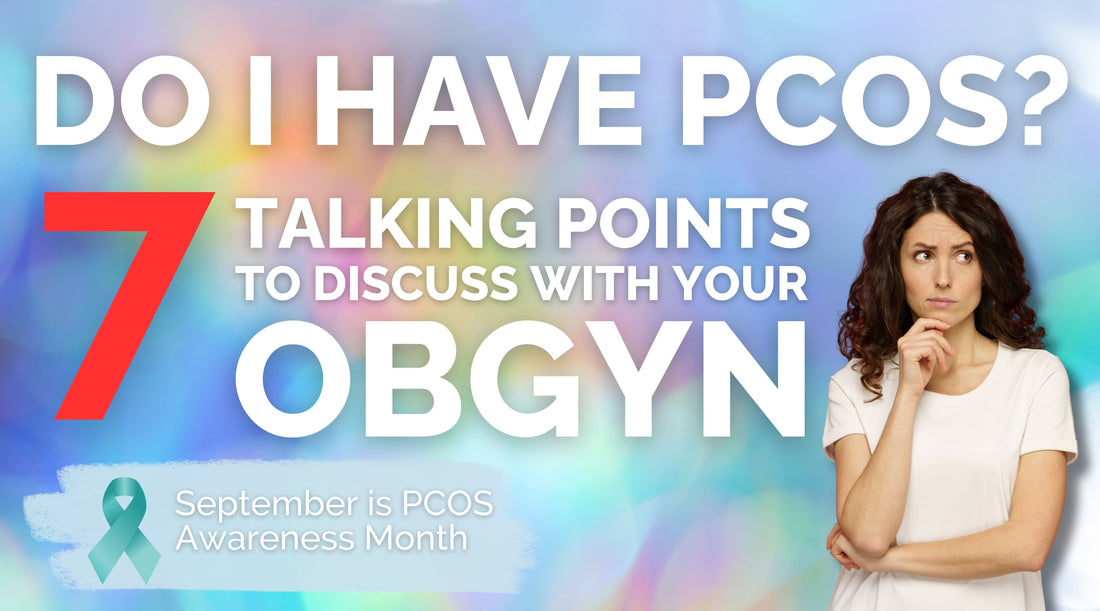
Don't Forget These 7 Things When You Talk to our OBGYN About PCOS
Share
September is upon us again, which means its the time we give particular attention to women's health during Polycystic Ovary Syndrome (PCOS) Awareness Month. For many people, it’s the first time they pause and ask themselves, “Could I have PCOS?” With millions affected worldwide, this hormonal condition is surprisingly common—but often misunderstood. One of the most important steps in managing PCOS is having an open, informed chat with your doctor.

But Is It?...
Because PCOS symptoms can overlap with typical menstrual pain or other conditions like endometriosis, adenomyosis, or PMS, it’s not always easy to recognize. That’s why coming prepared with questions and talking points can make all the difference.
Before you go in to meet with your doctor, make sure you're prepared so that you can create the most effective care plan. Here are 7 pieces of information that will be super helpful:
1. Your Menstrual Cycle Patterns
Bring details about your periods—are they regular, irregular, very light, or very heavy? Do you skip months at a time? PCOS often causes infrequent or absent ovulation, which may result in unpredictable cycles.

2. Symptoms Beyond the Period
Don’t just focus on cramps. PCOS often brings along other signs such as acne, excess hair growth (especially on the face or chin), hair thinning on the scalp, sudden weight changes, or dark patches of skin. Mention all of these, even if they feel unrelated.

3. Family History
Ask if PCOS, diabetes, or fertility challenges run in your family. Since PCOS is linked to insulin resistance and metabolic conditions, family health history can give your doctor important context.

4. Hormone and Blood Testing
Request lab work that checks hormone levels, including androgens, thyroid function, and insulin resistance markers. Blood tests can help rule out other conditions while confirming PCOS-related imbalances.

5. Imaging Options
An ultrasound can sometimes reveal enlarged ovaries or the presence of multiple small cysts. While not always necessary for diagnosis, imaging may provide clarity when combined with symptoms and bloodwork.

6. Long-Term Health Risks
PCOS doesn’t just affect fertility. It can increase the risk of type 2 diabetes, high blood pressure, and high cholesterol. Bring up concerns about your future health and ask about proactive steps you can take now.

7. Treatment and Lifestyle Support
Discuss both medical and non-medical options. Treatments may include birth control pills, insulin-sensitizing medications, or ovulation-inducing drugs if you’re trying to conceive. Lifestyle strategies like nutrition, movement, stress management, and sleep can also make a big difference—so ask for guidance that fits your needs.

A Natural Tool for PCOS Pain Relief: The Rezzimax Tuner
While PCOS is primarily a hormonal condition, many people with PCOS still experience pelvic pain, cramping, or muscle tension that can interfere with daily life. That’s where the Rezzimax Tuner can offer additional support.
The Tuner uses gentle vibration and resonance therapy to help relax tight muscles, reduce nerve irritation, and improve circulation. For PCOS-related pain, this can mean:
- Easing abdominal and pelvic muscle tension during or between cycles
- Reducing stress and calming the nervous system, which often worsens pain perception
- Supporting overall relaxation, which can benefit both physical discomfort and emotional well-being
While the Tuner isn’t a replacement for medical care, it can be a valuable complementary tool for managing the discomfort that sometimes comes with PCOS.

We've Cooked Up Something New
We’re super excited to introduce the PCOS Advanced Rezzipe—our newest step-by-step instructional video, designed specifically to guide you in using the Rezzimax Tuner for PCOS-related pain relief!
This easy-to-follow resource walks you through placement techniques, timing, and recommended routines, so you can use your Tuner with confidence. Whether you’re managing cramps, muscle tension, or general discomfort tied to PCOS, this new Rezzipe is is going to be a new favorite.

Rezzilution for Managing Pain
While its on your mind, take advantage of PCOS Awareness Month to learn, prepare, and take action. By bringing these seven talking points to your doctor, you’ll have a clearer, more productive conversation about your health. And by exploring supportive tools like the Rezzimax Tuner and the new PCOS Rezzipe, you can find natural, non-invasive ways to ease discomfort and support your overall well-being.
✨ Remember—you’re not alone. With the right knowledge, medical guidance, and supportive tools, managing PCOS is possible!